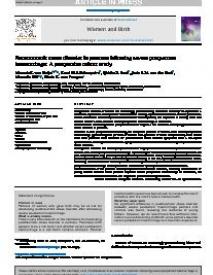Posttraumatic stress disorder in partners following severe postpartum haemorrhage : A prospective cohort study
Background: Partners of women are increasingly present during childbirth and may be exposed to a traumatic experience. Since parents’ mental health issues (i.e. posttraumatic stress disorder) have been shown to increase the risk of problems in the child’s development, it is important to identify these risk factors. Partners often describe severe postpartum haemorrhage as traumatic.
Aim: Whether witnessing severe postpartum haemorrhage is a risk factor for developing posttraumatic stress disorder in partners.
Methods: In this prospective cohort study, we compared partners of women with severe postpartum haemorrhage (≥2000 mL) and partners of women with 500 mL of blood loss (controls). Four weeks after birth partners were screened for posttraumatic stress disorder symptoms with a self-report questionnaire. Scores ≥ 11 were followed by a gold standard clinical interview to diagnose posttraumatic stress disorder. Findings: We included 123 severe postpartum haemorrhage partners and 62 control partners. Partners of women with severe postpartum haemorrhage reported higher scores than control partners (median 3.0 (0.0–7.0) vs 2.0 (0.0–4.0), p = 0.04) on symptoms of posttraumatic stress, but no significant difference in probable posttraumatic stress disorder diagnosis according to the self-report questionnaire was found. According to the clinical interview no partners were diagnosed with posttraumatic stress disorder. Severe postpartum haemorrhage was experienced as traumatic by the partners who felt excluded.
Conclusion: None of the partners developed posttraumatic stress disorder, revealing the resilience of young fathers. Because some partners reported severe postpartum haemorrhage as traumatic, we recommend sufficient information and support is provided during childbirth.
Geachte bezoeker,
De informatie die u nu opvraagt, kan door psychotraumanet niet aan u worden getoond. Dit kan verschillende redenen hebben,
waarvan (bescherming van het) auteursrecht de meeste voorkomende is. Wanneer het mogelijk is om u door te verwijzen naar de bron
van deze informatie, dan ziet u hier onder een link naar die plek.
Als er geen link staat, kunt u contact opnemen met de bibliotheek,
die u verder op weg kan helpen.
Met vriendelijke groet,
Het psychotraumanet-team.
In: Women and Birth ISSN: 1871-5192 | 33 | 4 | juli | 360-366
https://doi.org/10.1016/j.wombi.2019.06.016


